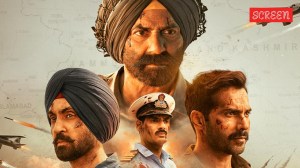Expressions
One-man showThe average Mumbaikar, caught in a nightmarish existence, will find much to identify with Tumbara, a Marathi play which premiere...

One-man show
The average Mumbaikar, caught in a nightmarish existence, will find much to identify with Tumbara, a Marathi play which premiered in the city, last week. Earth8230;fire8230;water8230;the elements of nature figure prominently in this one-man performance which comprises a series of dialogues with objects including a lamp and stove, with God and, of course, the Self. This is heavy8217; stuff and the director, Sunil Shanbag, has taken a great risk in staging a piece that may be more effective on a printed page. But with a powerful sound track which gets overbearing at times and an inspired performance by Sayaji Shinde who is also the playwright, Shanbag has pulled it off. In one-man shows, audience attention often strays. The 90 minutes passed by quickly, especially the second act which is rather short in any case and very different in tone from the first.
The depressive and aggressive feelings of the first act open up to some humour as man attempts to quot;adjust to lifequot;.
Despite therich imagery and metaphors, the problem with such writing and one-man shows is the tendency to become self-indulgent. One tends to repeat and there grows a sense of deja vu. Trimming the script would have helped the play, especially in the first act, where a point is often overstated. All in all, a tremendous effort. I8217;m sure the rhythmic quality of the play will be appreciated by non-Marathi speaking audiences as well. The work is supported by Udayan, an organisation which pledges to stage a play every year in order to quot;provide innovative and thought-provoking playwrights of any language a platform in the world of theatrequot;. With little support for experimental work, especially in English, let8217;s hope this paves the way for others to come forth.
For one8217;s self
The other one-person show I saw last week continued 8212; without an interval for two hours. So you can imagine the muscle power required in terms of script, direction and performance. Of course, with a seasoned actress like RohiniHattangady, one need not worry about performance. She sailed through a kaleidoscope of roles playing Aparajita which is also the title of the play, her husband, the maid-servant, the sister-in-law, the child8230; The play, it appeared, was designed to showcase her enormous talent. One-person shows often do that.
In fact, a few years ago, a British actor, who had performed at Prithvi Theatre, had frankly admitted his motive for writing a one-man play: to show the world what a good actor he was! Yes, those were his words. I don8217;t know if he has written another play after that one; naturally actors will be tempted to write juicy roles for themselves.
Aparajita explored a woman8217;s plight in the big, bad world. Many issues were touched upon including divorce and harassment on the job. But in the end, the day-to-day happenings lifted the script from the ordinary like the dialogues with dada and the bai chewing tobacco. The play could have been easily shortened, and made more crisp but the director,Jayadev Hattangady, chose to go the full length. Long plays seem to be in these days.
Macro musical
A musical montage of the Mahabharata 8212; Jaya 8212; has most certainly been designed with epic proportions. As it is a breakthrough of sorts in Indo-English theatre, I finally geared myself to see it last weekend. The blaring speakers never eased in a high-energy performance. There was no time to think then, but I wondered about many things later: Why do Indian themes sound odd in English? Are we too used to the actors performing Western musicals? Were some actors simply mouthing the songs without feeling the intensity of the characters? Would the symphonic score which fuses western and Indian music, jazz, rock, folk songs et al have been more effective were it not such a mish-mash? Would ethnic costumes have looked better?In a play of such magnitude, surely a million questions must have passed through the director, Lilette Dubey8217;s mind. A macro scale theatrical piece is a big risk in manyways. We8217;ve seen the technical problems faced by Sare Jahan Se Achcha.
The last word
Asked Ms Vulture to Ms Culture: Will it be Jaya for Mr Navalkar?
He clamps down on theatre, rock,
forgetting TV8217;s sleazes8230;
must that not be eased?
- 01
- 02
- 03
- 04
- 05































